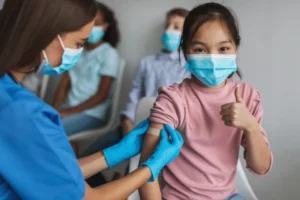Childhood vaccinations often raise concerns among parents, such as whether all vaccines are necessary, whether vaccinations can cause autism, and the risks of vaccine side effects. Understanding the facts about these issues is crucial for protecting your child's health. Here are answers to some common questions about childhood vaccinations:
Is natural immunity better than vaccine-induced immunity?
In general, preventing diseases through vaccination is safer and more effective than acquiring immunity through natural infection. While natural infection might provide a stronger immune response, it also comes with higher risks. For example, infection with Haemophilus influenzae type b (Hib) can lead to permanent hearing loss, brain damage, or death. Vaccines effectively protect against these severe diseases and their complications while reducing the risk of disease transmission.
Can vaccines cause autism?
Vaccines do not cause autism. Despite some parents' concerns about a link between vaccines and autism, extensive scientific research has confirmed that no such connection exists. The initial study suggesting a link, published in 1998, was retracted in 2010 and has been discredited. Current scientific evidence confirms that vaccines are safe, and there is no evidence linking vaccines to autism.
Are vaccine side effects dangerous?
Most vaccine side effects are mild, such as low fever, headache, irritability, or soreness at the injection site. Severe side effects, like allergic reactions or seizures, are very rare. Healthcare providers closely monitor children for adverse reactions after vaccination. If a child is known to be allergic to a specific vaccine component, that vaccine will be avoided. If a vaccine causes a severe reaction, it will be discontinued. Overall, the benefits of vaccination far outweigh the potential risks of side effects.
Why is it important to vaccinate infants early?
Infants are born with an immature immune system. Vaccination provides protection before their immune system is fully developed, helping prevent serious diseases and complications. Early vaccination also helps prevent the spread of diseases to others. The vaccination schedule is designed to provide the best protection when maternal immunity wanes and the child's immune system is ready, but before exposure to actual pathogens.
Is it possible to choose not to vaccinate against certain diseases?
Choosing not to vaccinate against certain diseases is not recommended, as it may leave your child unprotected and increase the risk of disease transmission. Here are some important considerations:
- Protecting Yourself and Others: Vaccines not only protect the vaccinated individual but also help protect high-risk groups, such as children with weakened immune systems and those unable to be vaccinated, through herd immunity.
- Disease Transmission: Unvaccinated children are more likely to contract and spread infectious diseases to others, especially those who cannot be vaccinated, such as newborns or individuals with compromised immune systems.
- Disease Risk: Some vaccine-preventable diseases, such as measles, whooping cough, and polio, may be less common in some areas but still pose serious health risks. Vaccination helps reduce the incidence of these diseases.
- Vaccination Schedule: The vaccination schedule is carefully designed to ensure optimal protection before the child's immune system matures. Delaying or skipping vaccinations can expose the child to pathogens before their immune system is fully developed.
If you have concerns about a particular vaccine, it is advisable to discuss them with a pediatrician or health professional. They can address your concerns, provide scientific information, and help you make an informed decision.











